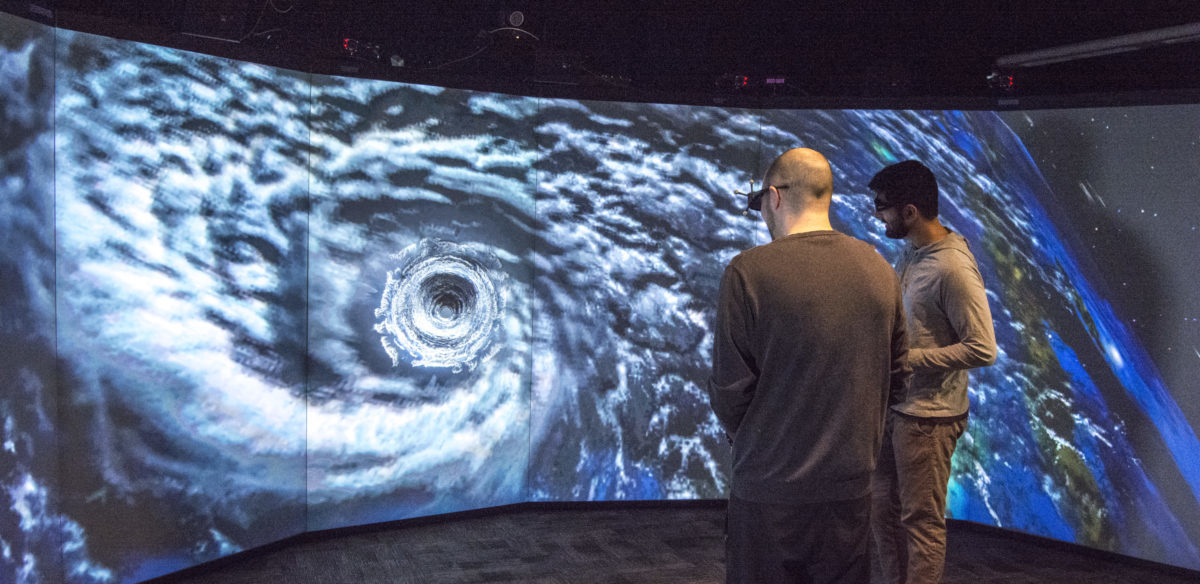Imagine being able to experience flying a plane without leaving the ground, or seeing in 3D how rainwater runoff will affect an area before a big storm.
This (and more) is made possible at Rowan University’s Virtual Reality Center, one of the five research centers located at the South Jersey technology park. The VR center offers a hands-on, project-based experience to students enrolled in Rowan University’s technology programs: Computer Science, Data Analytics, Bioinformatics and Engineering. To increase accessibility to the resource, the state-of-the-art VR Center is made available to all students in the programs, not just Ph.D. candidates.
The VR Center itself is an impressive build. It features a custom-made, 7-by-40-foot curved wall of screens — enough room for up to 25 people to work together on 3D applications. Users can choose from a variety of different augmented- and virtual-reality headsets such as the Microsoft HoloLens, HTC Vive, Oculus Rift, Meta 2 and ODG R-7 Smartglasses.
This $2-million system allows Rowan to partner on innovative projects with community, nonprofit, government and corporate clients — projects that always include work and input from Rowan students.
Anthony Fasolo, an Electrical Computer Engineering graduate student, came to Rowan as an undergrad from Sussex County Community College. “I wanted to learn basically everything,” says Fasolo. He appreciates the hands-on research experience he’s getting at Rowan: “You get to work on projects like you would in real-world situations.”
Learn moreThe diverse set of collaborative projects at the VR Center includes:
- A partnership with the FAA Technical Center to visualize drone flight data and create virtual drone experiences.
- A project with the U.S. Department of Commerce and Cooper’s Ferry Development Association Inc. that uses rainfall data and topographical mapping to create simulations and develop a solution for chronic flooding in Camden, N.J.
- A partnership with NASA to visualize rocket-engine tests stands at the Stennis Space Center in order to better predict the outcome of future firings.
Several Rowan alumni who worked in the VR Center have taken their experience to the next level by finding jobs at the companies that collaborate with Rowan.
When Zach Norris, also in the Electrical Computer Engineering graduate program, first enrolled at Rowan, it wasn’t for engineering. He was a physics student, minoring in math, and landed a job as a student worker in the VR Center. Working in the center made him realize that he really wanted to pursue engineering. As Norris puts it, “Getting paid to play around with virtual reality stuff is too much fun.”
George Lecakes, Jr., director of the VR Center and a Ph.D. candidate in Engineering, explains how the various levels of VR technology can alter or replace reality in different ways. “We can augment reality, give you a virtual reality, or a mixed reality,” he said.
“Augmented reality enhances what you already see,” added Lecakes, essentially projecting another layer of vision onto what you would normally see in a real-world setting. Whereas virtual reality puts you in a completely different, virtual space, replacing what you see. Mixed reality offers a bit of both.
By being able to visualize data in various ways, it’s possible to make that data easier to understand and more useful in real-world settings, creating a unique niche for the facility. “The Rowan University Virtual Reality Center,” said Lecakes, “can visualize and solve complex problems with hardware and software capabilities you’re not going to easily find elsewhere.”







